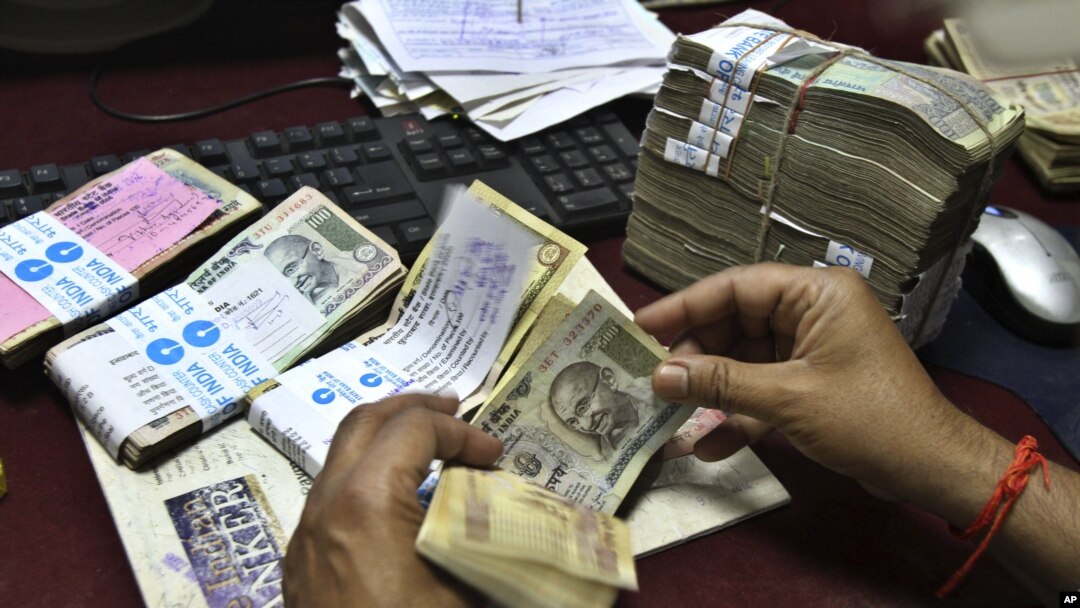NEW DELHI - India's currency has plunged to an all-time low versus the dollar, due to the Eurozone debt crisis and a slowdown in the Indian economy. The Indian government is scrambling to shore up its finances.
Signaling that India's economy faces tough days, Finance Minister Pranab Mukherjee says the government will have to impose unpopular austerity measures. These could include restrictions on buying new cars and overseas travel for officials.
The government is also mulling a hike in gas prices to reduce its subsidy bill.
The government's concerns stem from a steep fall in the value of the rupee versus the dollar, which has strained its finances. The rupee hit a new low on Friday after losing eight percent of its value in just six weeks.
Most Asian currencies have weakened in the past year, but the rupee has been impacted the worst, losing more than 20 percent of its value over the past year.
Finance Minister Mukherjee blames "the deteriorating international climate" for the fall of the local currency.
But he is allaying concerns about the health of India's economy. Mukherjee told parliament this week that a plunging rupee and a dip in economic growth is no need to push the panic button.
"Indian growth story is intact," said Mukherjee. "Yes, today we are disappointed because we have seen the success of growth story for quite some time… Yes, we are concerned that our GDP growth has come down, but I shall have to keep in mind that this is a difficult world, international situation is difficult."
Economists however say that it is not just the European crisis that has impacted India's currency and its growth. They cite growing worries over India's large fiscal deficit which is running at over five percent.
The slump in the rupee will worsen the situation by pushing up the country's import bill for its huge oil imports and will make it harder to fight inflation.
But India is trying to retain its attractiveness for investors. Indian officials are pushing for a ratings upgrade with officials at Fitch Ratings agency, who are in New Delhi to take stock of the economy. Indian officials have promised to control the fiscal deficit and say that India received foreign direct investment of $ 50 billion last year, the highest so far.
Last month, Standard & Poor's rating agency downgraded the outlook for India from stable to negative, citing the country's poor fiscal health and deteriorating economic indicators.
That was a setback for a country which is seen as one of the engines of global growth in the coming decades.
Signaling that India's economy faces tough days, Finance Minister Pranab Mukherjee says the government will have to impose unpopular austerity measures. These could include restrictions on buying new cars and overseas travel for officials.
The government is also mulling a hike in gas prices to reduce its subsidy bill.
The government's concerns stem from a steep fall in the value of the rupee versus the dollar, which has strained its finances. The rupee hit a new low on Friday after losing eight percent of its value in just six weeks.
Most Asian currencies have weakened in the past year, but the rupee has been impacted the worst, losing more than 20 percent of its value over the past year.
Finance Minister Mukherjee blames "the deteriorating international climate" for the fall of the local currency.
But he is allaying concerns about the health of India's economy. Mukherjee told parliament this week that a plunging rupee and a dip in economic growth is no need to push the panic button.
"Indian growth story is intact," said Mukherjee. "Yes, today we are disappointed because we have seen the success of growth story for quite some time… Yes, we are concerned that our GDP growth has come down, but I shall have to keep in mind that this is a difficult world, international situation is difficult."
Economists however say that it is not just the European crisis that has impacted India's currency and its growth. They cite growing worries over India's large fiscal deficit which is running at over five percent.
The slump in the rupee will worsen the situation by pushing up the country's import bill for its huge oil imports and will make it harder to fight inflation.
But India is trying to retain its attractiveness for investors. Indian officials are pushing for a ratings upgrade with officials at Fitch Ratings agency, who are in New Delhi to take stock of the economy. Indian officials have promised to control the fiscal deficit and say that India received foreign direct investment of $ 50 billion last year, the highest so far.
Last month, Standard & Poor's rating agency downgraded the outlook for India from stable to negative, citing the country's poor fiscal health and deteriorating economic indicators.
That was a setback for a country which is seen as one of the engines of global growth in the coming decades.


